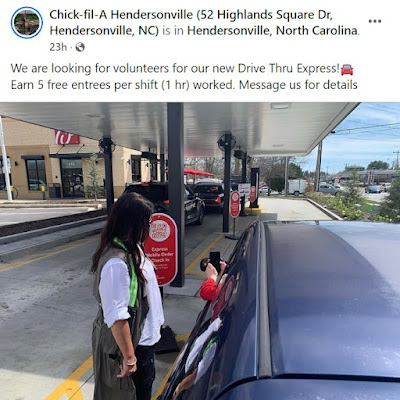"We are looking for volunteers for our new Drive Thru Express!🚘 Earn 5 free entrees per shift (1 hr) worked. Message us for details"
Thursday, July 28, 2022
Unlike ordering at Chick-Fil-A, legal compliance isn’t chosen from a menu.
"We are looking for volunteers for our new Drive Thru Express!🚘 Earn 5 free entrees per shift (1 hr) worked. Message us for details"
For more information, contact Jon at (440) 695-8044 or JHyman@Wickenslaw.com.
Do you like what you read? Receive updates two different ways:
Subscribe to the feed or register for free email updates.
Wednesday, July 27, 2022
Have you listened to Labor Relatedly yet?
Over the past few years, I've toyed with the idea of launching my own legal podcast. Two things have held me back. First, I don't really want to add another "thing" for me to manage. Secondly, other people ask me to guest on their podcasts and I feel like I'm getting enough bang for the podcasting buck that the added time of recording and producing my own show wouldn't justify any additional return.
Thus, I jumped at the chance when my friend Michael VanDervort asked if I wanted to join his existing podcast, DriveThruHR, as a recurring co-host to discuss all things labor relations in light of current and historic rise in union organizing.
For more information, contact Jon at (440) 695-8044 or JHyman@Wickenslaw.com.
Do you like what you read? Receive updates two different ways:
Subscribe to the feed or register for free email updates.
Tuesday, July 26, 2022
Posting about litigation (actual or potential) is a terrible idea
Until yesterday, Erin Overbey worked as an editor at The New Yorker. Shortly after her termination, Overbey took to Twitter to write about her termination. Across 35 tweets, she accuses the magazine of retaliating against her because of she had previously raised concerns over its lack of equity and inclusivity.
For more information, contact Jon at (440) 695-8044 or JHyman@Wickenslaw.com.
Do you like what you read? Receive updates two different ways:
Subscribe to the feed or register for free email updates.
Monday, July 25, 2022
Cursing in the workplace
According to one survey, 57% of American employees admit to swearing at work. (Count me in the "yes" column.)
Where is the line between swearing as harmless workplace banter and swearing as harmful unlawful harassment? The seminal case is Reeves v. C.H. Robinson Worldwide, which involved the female plaintiff's offense to the salty language used by male co-workers in nearby cubicles.
For more information, contact Jon at (440) 695-8044 or JHyman@Wickenslaw.com.
Do you like what you read? Receive updates two different ways:
Subscribe to the feed or register for free email updates.
Friday, July 22, 2022
WIRTW #634: the “%@$&*!” edition
 |
| Vacation 💑 |
What is the word for a string of typographical symbols (such as %@$&*!) used in place of an obscenity, especially in comic strips?
Take your best guess in comments, and I'll provide the correct answer on Monday. No Googling!
Here's what I read and listened to this week and last week that I think you should be reading and listening to, too.
For more information, contact Jon at (440) 695-8044 or JHyman@Wickenslaw.com.
Do you like what you read? Receive updates two different ways:
Subscribe to the feed or register for free email updates.
Thursday, July 21, 2022
We need to talk about litigation holds and spoliation of evidence
The situation playing out in real time between Congress and the Secret Service over text messages related to the Jan. 6th insurrection is quite the teachable moment on litigation holds and spoliation of evidence.
On Jan. 16, 2021, Congress sent the Department of Homeland Security (which oversees the Secret Service) a broad preservation and production request for documents related to Jan. 6, which included communications "received, prepared or sent" between Jan. 5 and Jan 7.
Following the Jan. 16 request, the Secret Service explained to employees that it was up to them to preserve records from their phones and provided a step-by-step guide to preserve mobile phone content, including text messages, prior to a phone migration that occurred on Jan. 27. That migration, however, appears to have caused a widespread destruction of data, as the Secret Service has only been able to produce to the Jan. 6 Committee one text message from the critical three-day window.
What went wrong?
A lot, apparently.
For more information, contact Jon at (440) 695-8044 or JHyman@Wickenslaw.com.
Do you like what you read? Receive updates two different ways:
Subscribe to the feed or register for free email updates.
Wednesday, July 20, 2022
A modest proposal to revamp continuing legal education credits #CLECreditsforBlogging
"I'm finishing all my CLE credits this week. It amazes me how if you keep up with law changes regularly how out-of-date these CLEs feel."
That's an excerpt of a recent conversation between my friend, Kate Bischoff, and me. Kate is 100 percent correct. I learn very little, if anything from the continuing education courses I take. I take them because the Ohio Supreme Court requires me to check a 24-credit box every two years, not because they offer me any educational value.
For more information, contact Jon at (440) 695-8044 or JHyman@Wickenslaw.com.
Do you like what you read? Receive updates two different ways:
Subscribe to the feed or register for free email updates.






